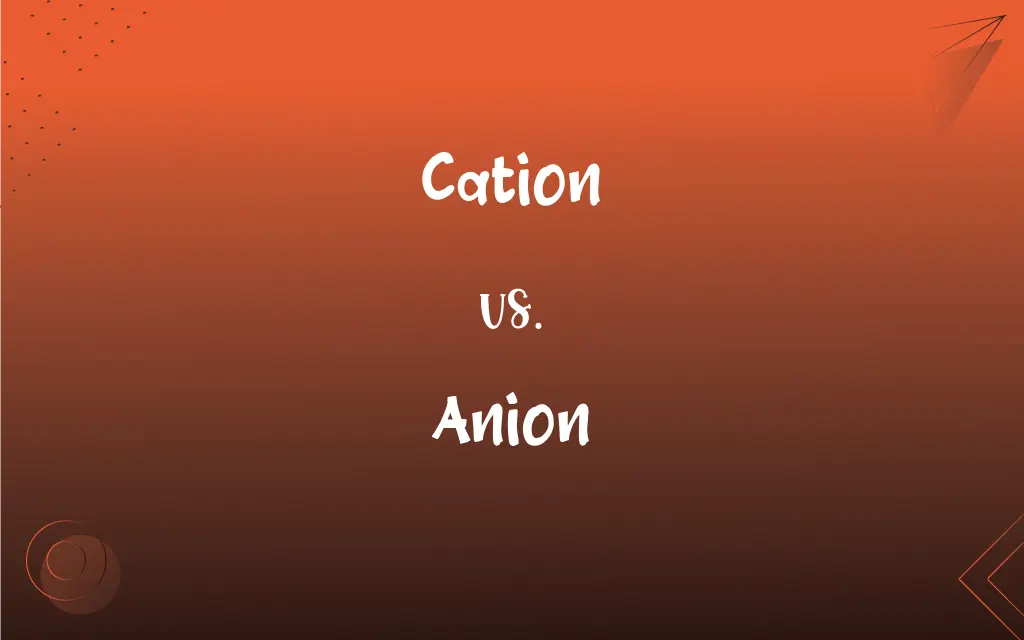Cation vs. Anion: What's the Difference?
Edited by Aimie Carlson || By Harlon Moss || Updated on October 11, 2023
Cations are positively charged ions (loss of electrons), while anions are negatively charged ions (gain of electrons). They are formed through the ionization of atoms.

Key Differences
Cations and anions serve as fundamental components in the realm of chemistry, often facilitating reactions by transferring electrons among themselves. The cation, being positively charged, signifies a loss of electrons from an atom, conversely, an anion, with its negative charge, indicates a gain of electrons. These ions are notable for their pivotal roles in creating compounds, as their opposing charges attract, enabling the formation of neutral chemical compounds.
Considering their essential roles in chemical reactions, cations and anions are crucial in maintaining the balance within a reaction. The cation, upon losing its electron(s), typically plays a role in facilitating electrical conductivity in solutions. In contrast, anions, by accepting those electrons, ensure that charge neutrality is maintained in compounds, thereby sustaining stability in various substances and mixtures.
The appearance of cations and anions is widespread in various aspects of science and industry. Cations, due to their electron-deficient nature, tend to seek electron-rich anions to form stable substances, such as common table salt (NaCl), where sodium (Na+) acts as a cation and chlorine (Cl-) as an anion. This interplay is fundamental in the formation of a plethora of substances that are integral to numerous industrial processes and daily life.
The physiological and environmental implications of cations and anions are profound. For instance, cations like calcium (Ca2+) and potassium (K+) are pivotal in biological systems for processes like nerve impulse transmission. On the other hand, anions like chloride (Cl-) and bicarbonate (HCO3-) also facilitate physiological functionalities, including maintaining osmotic balance and pH levels, showcasing the extensive and diverse roles of these ions.
Comparison Chart
Charge
Positive (+)
Negative (-)
ADVERTISEMENT
Electron Dynamics
Loses electrons
Gains electrons
Common Examples
Sodium (Na+), Potassium (K+)
Chloride (Cl-), Oxide (O2-)
Role in Electrical Current
Often facilitates current flow in solutions
Typically does not facilitate current flow
Presence in Human Body
Found in muscles, nerves
Common in bodily fluids, cells
Cation and Anion Definitions
Cation
A cation is an ion with a net positive charge.
Sodium becomes a cation (Na+) when it loses an electron.
ADVERTISEMENT
Anion
An anion is an ion bearing a negative charge due to the gain of electrons.
Chloride (Cl-) is an anion formed when chlorine gains an electron.
Cation
A cation results from an atom losing one or more electrons.
Calcium becomes a cation (Ca2+) by shedding two electrons.
Anion
Anions migrate towards the anode during electrolysis.
In electrolytic cells, the anion oxide (O2-) moves toward the positive electrode.
Cation
Cations are frequently metal ions.
Potassium (K+) is a cation vital for cellular functions.
Anion
Anions are crucial for maintaining physiological pH and osmotic balance.
The bicarbonate anion (HCO3-) plays a vital role in maintaining blood pH.
Cation
In electrochemical cells, cations migrate toward the cathode.
During electrolysis, cations move towards the negatively charged electrode.
Anion
Anions typically consist of nonmetals or polyatomic groups.
The sulfate anion (SO4^2-) is commonly found in various minerals.
Cation
Cations in the body, like Na+ and K+, are essential for nerve transmission.
Without the cation sodium (Na+), nerve cells could not properly transmit signals.
Anion
Anions in solution are often used to conduct electrical current.
In batteries, the anion fluoride (F-) facilitates the flow of electrical current.
Cation
An ion or group of ions having a positive charge and characteristically moving toward the negative electrode in electrolysis.
Anion
A negatively charged ion, especially the ion that migrates to an anode in electrolysis.
Cation
(physical chemistry) a positively charged ion, i.e. one that would be attracted to the cathode in electrolysis
Anion
A negatively charged ion.
Cation
A positively charged atom, radical, or molecule, which in electrolysis migrates to the cathode; a positive ion; - opposed to anion.
Anion
An electro-negative atom or group of atoms, or the element which, in electro-chemical decompositions, is evolved at the anode; - opposed to cation.
Cation
A positively charged ion
Anion
A negatively charged ion
FAQs
How is an anion formed?
An anion is formed when an atom gains one or more electrons.
What is a cation?
A cation is a positively charged ion.
How is a cation formed?
A cation is formed when an atom loses one or more electrons.
Can a cation be a nonmetal?
Typically, cations are metals, but under certain conditions, nonmetals can form cations.
What is a common example of an anion?
Chloride (Cl-) is a common example of an anion.
Can an anion be a metal?
Anions are usually nonmetals or polyatomic groups.
What is a common example of a cation?
Sodium (Na+) is a common example of a cation.
Where do cations migrate during electrolysis?
Cations migrate toward the cathode during electrolysis.
Where do anions migrate during electrolysis?
Anions migrate toward the anode during electrolysis.
What role do anions play in biology?
Anions like Cl- and HCO3- help in maintaining osmotic balance and pH in biology.
Can a cation exist independently?
Yes, cations can exist independently, especially in gaseous or dissolved forms.
Are cations always metals?
Cations are typically metals, but certain nonmetals can form cations under specific conditions.
Why are cations important in chemistry?
Cations are crucial in forming neutral ionic compounds and facilitating electrochemical reactions.
Why are anions important in chemistry?
Anions are vital for forming ionic compounds, conducting electrical current, and maintaining charge neutrality.
What is an anion?
An anion is a negatively charged ion.
What role do cations play in biology?
Cations like Na+ and K+ play essential roles in nerve impulse transmission in biology.
Can an anion exist independently?
Yes, anions can exist independently, particularly in a gaseous state or in solution.
Are anions always nonmetals?
Anions are typically nonmetals, although there are polyatomic anions that contain metals.
Is a cation larger or smaller than its parent atom?
Cations are typically smaller than their parent atoms.
Is an anion larger or smaller than its parent atom?
Anions are generally larger than their parent atoms.
About Author
Written by
Harlon MossHarlon is a seasoned quality moderator and accomplished content writer for Difference Wiki. An alumnus of the prestigious University of California, he earned his degree in Computer Science. Leveraging his academic background, Harlon brings a meticulous and informed perspective to his work, ensuring content accuracy and excellence.
Edited by
Aimie CarlsonAimie Carlson, holding a master's degree in English literature, is a fervent English language enthusiast. She lends her writing talents to Difference Wiki, a prominent website that specializes in comparisons, offering readers insightful analyses that both captivate and inform.































































